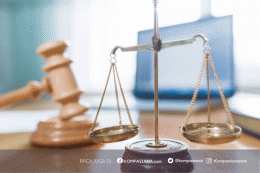However, when a recipient of an amnesty or pardon uses this opportunity to sue the judge who ruled on their case, this action can be interpreted as an abuse of the President's prerogative . This is because, implicitly, the lawsuit creates the public impression that the President's pardon is a form of "justification" for the judge's alleged misconduct. However, constitutionally, the granting of a pardon has absolutely no bearing on the validity or accuracy of the judge's decision.
The President's prerogative operates within the realm of legal policy, viewing cases from the perspective of broader state interests: political stability, national security, or social reconciliation. Meanwhile, judges operate within the realm of judicial law enforcement, bound by evidence, procedures, and positive legal norms (Marzuki, 2017). Conflating these two realms constitutes a conceptual error that has the potential to blur the boundaries between executive and judicial power, thus disrupting the balance of power that is a fundamental principle of constitutional democracy.
If someone believes they are legally innocent , the honorable and logically consistent course of action is to reject the grant of amnesty or pardon and then continue their resistance through the available legal mechanisms---appeal, cassation, or judicial review. In this way, the acquittal or release obtained has full judicial legitimacy, not simply the result of legal political intervention. Conversely, accepting amnesty and then attacking the judge means enjoying the benefits of amnesty while undermining its symbolic meaning.
Such actions can be interpreted as an instrumentalization of mercy ---the use of state pardon policies as a tool for personal ends, rather than for the common good (Dworkin, 1986). Worse still , this step could pit the President against the judiciary in public opinion, creating the perception that executive decisions are tacitly correcting judicial decisions. However, according to Montesquieu's (1748/1989) doctrine of separation of powers, each branch of government has its own legitimacy and should not be used to undermine the other.
The motivation behind such actions is indeed questionable . If the motive is simply "defending one's good name" or "correcting a legal error", then accepting abolition would be a logical contradiction. This is because abolition eliminates the prosecution process and its legal implications without overturning the existing verdict. In legal philosophy terms, this is a performative inconsistency: saying one thing (wanting to clear one's name through the law) while doing the opposite (receiving a political pardon).
From a national ethical perspective, this action violates the mystical values of national consciousness rooted in the spirit of sacrifice and political honesty. The nation's founders designed prerogative not as a political trading instrument, but as a bridge to overcome legal impasses and safeguard the greater national interest. Using it to counterattack judges actually diminishes the nation's dignity .
Within the framework of political responsibility theory, every pardon recipient has a moral responsibility to maintain the integrity of the policy (Thompson, 1987). Making it a tool of confrontation violates the unwritten moral contract between the pardon recipient and the pardoner--- namely, that pardons are given to close wounds, not open new ones.
To prevent a recurrence of similar phenomena, legal norms need to be strengthened, stating that state pardons cannot be used as a basis for challenging a judge's final decision unless there is clear evidence of ethical or criminal violations during the judicial process. This could be incorporated into the revision of Emergency Law No. 11 of 1954 or through constitutional interpretation by the Constitutional Court.
Politically, the President also needs to consider the profile and track record of abolition or amnesty recipients to minimize the risk of abuse. In the tradition of state politics, pardons are ideally granted to those who not only meet the legal requirements but also demonstrate ethical behavior consistent with the goals of the pardon policy itself (Sunstein, 1996).
Ultimately, the president's prerogative is a symbol of state sovereignty that transcends the rigidity of the law for the sake of humanity and national interests. Using it as political ammunition to attack judges reduces this noble symbol to a mere tool for personal maneuvering. At this point, what is at stake is not only the credibility of the judiciary, but also the dignity of the presidential institution.
The philosophical awareness that needs to be revived is that this republic is founded on a relationship of mutual respect between the branches of government. The president, judges, and politicians are all servants of the state, each with their own jurisdiction. Crossing that boundary with destructive intent is a form of political malpractice that erodes the foundations of Pancasila democracy. Therefore, if one's true goal is to defend one's good name, one should do so through sound legal channels, without harming the hand that has granted forgiveness.







